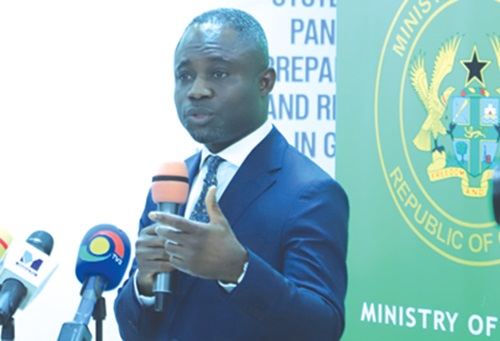The Minister of Health, Kwabena Mintah Akandoh, has assured the nation that the recent rise in COVID-19 cases reported at the University of Ghana (UG) is not due to a new virus, but rather a familiar sub-variant of Omicron, which the country has successfully managed in the past.
He explained that the outbreak was localised at the university campus, with all confirmed cases recovering, emphasising that there was no need for panic, but continued vigilance was essential.
“Mr Speaker, I want to assure Ghanaians that this is not a new virus, and we are not back to 2020. This Omicron variant has been with us before. It spreads fast, yes - but it is mostly mild.
And we know how to manage it.
“We’ve beaten back bigger waves before, and we can do it again — with calm, cooperation and good public health practices,” he said.
Mr Akandoh gave the assurance yesterday on the floor of parliament, where he delivered a comprehensive report on the country’s public health preparedness, response measures, and the status of infections, vaccinations and surveillance systems in response to the sudden resurgence of COVID-19 cases at the University of Ghana.
Cause
The recent outbreak was detected through the country’s influenza surveillance system and confirmed by the Noguchi Memorial Institute for Medical Research.
As of yesterday, 316 suspected cases had been reported, out of which 107 were confirmed as COVID-19.
There have been no hospitalisations or deaths, and all confirmed cases are recovering well.
Mr Akandoh identified the recent spike in COVID-19 cases as being primarily caused by large gatherings during Hall Week celebrations, where adherence to safety protocols such as mask-wearing and physical distancing was minimal.
He said investigations also revealed a general decline in the observance of basic COVID-19 preventive measures and difficulties in contact tracing, even after the university community became aware of the outbreak.
In response, he said the government swiftly mobilised a national response team to collaborate with the university and municipal health authorities.
“Once the first signals came in, we moved quickly. Here’s what we did: we held meetings with the Director-General of the Ghana Health Service, heads of Noguchi and the School of Public Health and issued alerts to all health facilities nationwide.
“The university suspended all Hall Week activities and launched a campus-wide education campaign using posters, campus radio, and student leaders,” he added.
He further revealed that the government was implementing a series of proactive steps, including boosting support for Legon Hospital and the Students Clinic, enhancing data tracking in health facilities and preparing the Ghana Infectious Disease Centre to manage severe cases if they arise.
Additionally, face-to-face engagements with students and faculty were ongoing, and more personal protective equipment (PPE) training is being provided to frontline health workers, while testing and daily monitoring efforts are being strengthened.
Treatment options
The Minister of Health clarified that COVID-19 vaccination was no longer part of Ghana’s routine immunisation programme, as is the case in many countries.
However, he said vaccination remained vital in preventing severe illness and death, especially among vulnerable groups, such as the elderly and those with underlying conditions.
He, however, revealed that the government was securing vaccines in preparation for a possible surge.
Mr Akandoh also assured the public that effective treatment, including Paxlovid — an antiviral drug for patients with co-morbidities — is available, adding that most infections were mild and managed at home, with hospitals ready for more serious cases.
To help stop the spread of COVID-19 and other respiratory illnesses, the minister urged everyone to take simple but effective precautions.
These include washing hands regularly with soap and water, wearing masks in crowded or poorly ventilated places, staying home when feeling unwell and avoiding gatherings if sick.
He also advised people with symptoms to visit the nearest clinic promptly for medical attention.
“The Ministry of Health has made sure that our response is well resourced. Personal protective equipment, test kits and treatment supplies are all in place.
“Health workers are being supported, and emergency centres like the Ghana Infectious Disease Centre are on standby,” the minister added.

